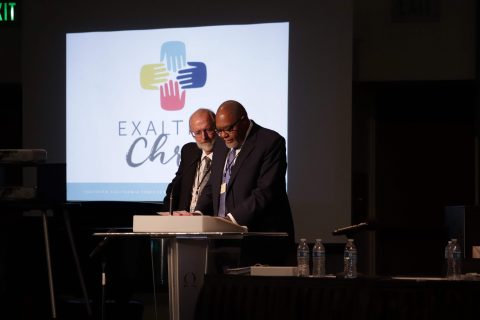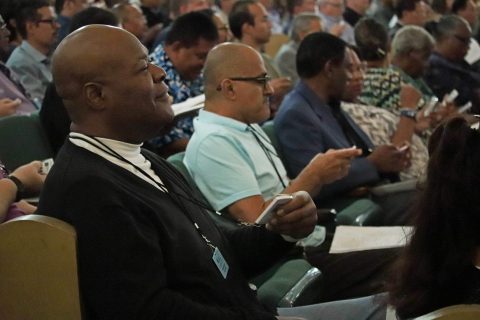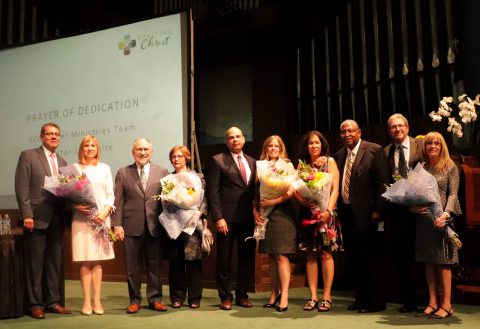
On September 22, 917 delegates convened at the White Memorial church for the 65th constituency session of the Southern California Conference (SCC). The theme of the session was “Exalting Christ,” a theme chosen to reflect the core of SCC’s new mission statement.
The session began with meaningful time spent in worship. Attendees were blessed by music from 151 students from Glendale Adventist Academy, Newbury Park Academy, San Fernando Academy, and San Gabriel Academy, who formed a mass choir—the largest at a constituency session in SCC history. NAD President Dan Jackson gave an inspirational devotional focusing on our shared faith and mission. The worship service concluded with a season of prayer.
Once quorum was declared, the business portion of the session began. The General Conference Auditing Service presented details of the 2015- 2018 audit report. SCC has received an unqualified opinion, the highest opinion given, which means that the conference has earned a clean audit.

“We can continue this work in treasury by implementing technologies that allow us to do more without having to increase expenses of the conference,” said Orville Ortiz, SCC treasurer, “thus maximizing the dollars that are saved for evangelism and other ministry endeavors.”

Prior to the session, delegates had received reports from the officers, departments, and nominating and bylaws committees. During the weeks leading up to the session, every member—regular and at-large delegates and even non-delegates— had an opportunity to attend town hall meetings to voice concerns or ask questions regarding these reports.
Dakota White, a first-time delegate from All Nations church, was unsure of what to expect walking into the session that morning but left with hope for the future. “I found so much comfort in seeing the many church members represented at the session; it’s a great reminder that we are all in this together,” said White. “Voices were heard, concerns were noted, and all had the opportunity to speak to what we believe will help us move forward more united.”
At the session, the combined officers’ video report emphasized SCC’s diverse community and highlighted the innovative ways this conference has embraced its community in Christ. A second video explaining SCC’s mission, vision, and values was also shown.
Delegates voted to approve the proposed changes to the conference bylaws, including three significant changes:
• Extend the interval between constituency sessions from four years to five.
• Change the formula for regular delegates: Each church is allowed a minimum of one regular delegate, plus one additional delegate for each 75 members (previously 50 members).
• A change in title from superintendent of education to vice president for education, with the position to be considered an administrative officer.

Following the nominating committee report, all five conference officers were re-elected for the next quinquennium: Velino A. Salazar, president; John H. Cress, executive secretary; Orville Ortiz, treasurer; James G. Lee, executive vice president; and Harold A. Crook, vice president for education.
Cress and Ortiz, who were both hired after the 2015 constituency session, were voted by delegates for the first time. “My heart is filled with gratitude for being given the trust of the Southern California Conference constituents,” said Cress. “I certainly do not have the ‘right’ to serve as executive secretary. It is a humble honor to have this opportunity to continue as a servant leader.”
Crook, who was re-elected with an elevated position per the accepted bylaws changes, is looking forward to developing new strategies for church subsidies and alternative funding for affordable Christian education. “I would like to thank you for the confidence that you have placed in me as your vice president for education, as well as all the principals, teachers, and school staff for their dedicated work in bringing our students to Jesus,” said Crook. “It is truly a privilege to work alongside the Christian educators, pastors, boards, parents, and students of the Southern California Conference.”
In addition to the executive officers, delegates also elected members of both the conference executive and bylaws committees for the next term. (See sidebar.)
“Leadership is not a right—it is a privilege,” said Salazar. “In the church, we consider this an invitation from God, and our commitment is with God to serve His people.”

